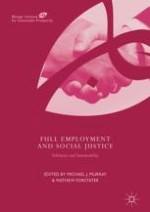2018 | OriginalPaper | Buchkapitel
4. Getting Serious About the Limits to Growth: ELR and Economic Restructuring Under Decroissance
Macroeconomic Policy and Environmental Realities: Can We Have Full Employment Under Decroissance?
verfasst von : Hendrik Van den Berg
Erschienen in: Full Employment and Social Justice
Aktivieren Sie unsere intelligente Suche, um passende Fachinhalte oder Patente zu finden.
Wählen Sie Textabschnitte aus um mit Künstlicher Intelligenz passenden Patente zu finden. powered by
Markieren Sie Textabschnitte, um KI-gestützt weitere passende Inhalte zu finden. powered by
